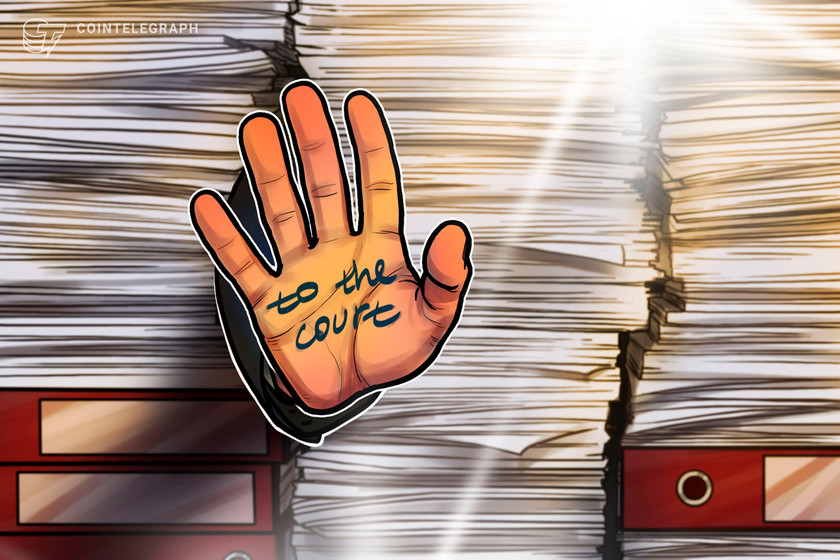
Cameron Winklevoss, the co-founder of US-based exchange giant Gemini, has issued his “best and final offer” to Digital Currency Group (DCG) CEO Barry Silbert. DCG is the parent company of the bankrupt crypto lender Genesis. Cameron Winklevoss and his twin brother Tyler Winklevoss have been in a public social media spat with Silbert for months […]
The post Cameron Winklevoss Gives ‘Final Warning’ to Barry Silbert and Digital Currency Group After Alleged Debt Delinquency appeared first on The Daily Hodl.

Genesis CEO Barry Silbert should have come clean after FTX imploded. Instead, he’s still deflecting responsibility for his company’s bankruptcy.
Just two months after the collapse of FTX, Genesis is following suit.
Against an increasingly disheartening backdrop of “Big Cryptos” going bust, Barry Silbert’s cryptocurrency lender, Genesis Global Holdco, is the latest firm to file for bankruptcy, and if things always come in three, it might not be the last.
Genesis Capital’s parent company, Digital Currency Group, has denied any involvement in the bankruptcy filing, citing “a special committee of independent directors” in charge of the decision, seemingly without any input from Silbert himself. But both companies are already getting hit with fresh securities class-action lawsuits alleging violations of federal securities laws.
The complaint also alleges “securities fraud through a scheme to defraud prospective and current digital asset lenders by making false and misleading statement[s],” which translates to: Silbert knowingly and intentionally lied about the company’s health, profits and future viability, thereby violating section 10(b) of the United States Securities Exchange Act.
Well, this is easy to confirm.
Genesis’ derivatives business had $175 million exposure to FTX, but back in November, when the exchange collapsed, the firm wasn’t forthcoming about its precarious position and released a series of frustratingly contradictory statements that left the community more in the dark than ever.
Genesis Timeline
— Cred (@CryptoCred) November 21, 2022
November 8: "No material net credit exposure"
November 9: We lost $7M
November 10: Okay, we have $175M locked in FTX
November 16: Sorry, no withdrawals or new loans
November 17: Okay, we need $1BN
November 21: We'll go bankrupt without the money
Then, at the turn of a switch, it started reassuring the community with conciliatory, PR-perfect public messaging. As I wrote in early December, Silbert spent months dismissing the “noise” surrounding both his company and the crypto space at large while reassuring investors that despite the crypto winter we were all facing, the company was on track to reach $800 million in revenue and its separate entities were “operating as usual.”
Related: Will Grayscale be the next FTX?
Here’s the danger: Through Digital Currency Group — which also owns the asset manager running the world’s largest Bitcoin (BTC) fund, Grayscale, mining company Foundry, crypto investment app Luno and media outlet CoinDesk, among more than 200 others — Silbert controls a large portion of the crypto landscape, and so far, he has been somewhat responsible both for keeping spirits up and for keeping panic at bay.
Furthermore, Genesis’ clients include Circle, which operates the stablecoin USD Coin (USDC), pegged to the U.S. dollar, and the Winklevoss-backed Gemini, whose founders have called for Silbert to be removed as CEO.
A first discrepancy — which, in retrospect, we can perhaps recognize as a huge sign of alarm — came on Nov. 18, when DCG’s Grayscale stated it wouldn’t share its proof of reserves with customers. A second, very clear indication that something was amiss came on Jan. 5, when Genesis laid off 30% of its workforce — following a previous August restructuring that saw it cutting its workforce by 20% and CEO Michael Moro stepping down from his leadership position and moving into an advisory role.
“As we continue to navigate unprecedented industry challenges, Genesis has made the difficult decision to reduce our headcount globally,” a spokesperson told Cointelegraph in the wake of the January layoffs. “These measures are part of our ongoing efforts to move our business forward.”
Related: Crypto exchanges keep failing, so why do we still trust Changpeng Zhao?
Well, it appears that moving forward won’t be part of Genesis’ future, and perhaps — unbeknownst to us — it never was. So, why were investors kept in the dark for so long?
Since the bankruptcy announcement, Genesis’ public statements have shown no remorse, humility or accountability whatsoever. Silbert seems to think he can just move on with a simple “this is what happened” and not need to acknowledge that errors were made and billions of dollars were lost. That’s unacceptable.
Silbert could, and should, have come clean back in November in the wake of the FTX fiasco. Instead, he kept a low profile for months just when everyone had their eyes on him and declared bankruptcy like a thief in the night, yet again humiliating the crypto world and disappointing the community as a whole. That’s a pretty low blow, and just like in Sam Bankman-Fried’s case, it shows that crypto management needs a complete overhaul.
Sure, Genesis’ case might not be quite as bad as FTX, but who knows how long it could have gone on? Who’s to say what such terrible management could be capable of if left alone and undetected?
It’s not in my nature to be pessimistic. I’m young, and so is crypto — I believe the best is yet to come for the industry, but it won’t be easy, and it will require a degree of transparency and accountability that we haven’t yet seen.
If the cascading effect of the crashes of the last few months is anything to go by, Genesis might be the latest firm to collapse, but not the last. We need to keep our eyes open and our instincts en garde. If we don’t, we won’t survive, and neither will crypto.
This article is for general information purposes and is not intended to be and should not be taken as legal or investment advice. The views, thoughts and opinions expressed here are the author’s alone and do not necessarily reflect or represent the views and opinions of Cointelegraph.

Amid Genesis going through its first bankruptcy hearings, a group of creditors have slapped the firm with a new class action lawsuit.
Troubled cryptocurrency company Digital Currency Group (DCG) is facing more legal issues as its subsidiary Genesis Capital got slapped with a new class action lawsuit.
A group of Genesis creditors filed a securities class action (SCA) lawsuit against DCG and its founder and CEO Barry Silbert, alleging violations of the federal securities laws.
The lawsuit was filed by Connecticut-based law firm Silver Golub & Teitell (SGT) on behalf of individuals and entities who entered into digital asset lending agreements with Genesis. The law firm is known for handling major industry lawsuits, including a class action suit filed against Coinbase in March 2022.
The new complaint against DCG and Silbert alleges that Genesis engaged in an unregistered securities offering in violation of securities laws by executing lending agreements involving securities without qualifying for an exemption from registration under the federal securities laws.
The lawsuit also alleges that Genesis committed securities fraud through a scheme to defraud potential and existing digital asset lenders by making false and misleading statements. According to plaintiffs, Genesis intentionally misrepresented the financial condition of Genesis, violating section 10(b) of the United States’ Securities Exchange Act.
“The scheme to defraud was carried out, according to the complaint, in order to induce prospective digital asset lenders to loan digital assets to Genesis Global Capital and to prevent existing lenders from redeeming their digital assets,” SGT lawyers noted.
Founded in 2015, DCG is a Connecticut-based crypto firm that serves as the parent company of multiple digital asset and blockchain-focused subsidiaries, including Genesis, digital asset manager Grayscale Investments, crypto mining firm Foundry and crypto media outlet Coindesk. DCG’s current CEO Silbert maintains a controlling 40% equity stake in the firm and also serves as chairman of its board of directors.
The news comes amid Genesis going through its first bankruptcy hearings on Jan. 23 after the firm filed for bankruptcy on Jan. 19. The bankruptcy filing came a few months after Genesis halted withdrawals on Nov. 16 as it became unable to honor redemption requests amid the bear cryptocurrency market.
Related: Genesis eyes fast resolution to creditor disputes and bankruptcy exit in May
Gemini, a crypto trading platform founded by Winklevoss brothers, is one of the biggest creditors of Genesis, with the firm reportedly owing $900 million to Gemini’s clients. On Jan. 20, Gemini co-founder Cameron Winklevoss took to Twitter to declare that the firm has been preparing to take direct legal action against DCG, Silbert and “others who share responsibility for the fraud.”
It appears to be unclear whether Gemini is part of the lawsuit filed by SGT. The law firm did not immediately respond to Cointelegraph’s request to comment.

The co-founder of US-based exchange giant Gemini is announcing his exchange will sue the parent company of bankrupt crypto lender Genesis. Yesterday, Genesis Global Capital, LLC filed for Chapter 11 bankruptcy after weeks of speculation that they could do so. The Gemini co-founder and his twin brother Tyler Winklevoss have been in a public social media spat with Genesis’ […]
The post Cameron Winklevoss Says Gemini Will Sue Digital Currency Group and Barry Silbert As Genesis Files for Bankruptcy appeared first on The Daily Hodl.

A special committee of independent directors recommended and decided to file for Chapter 11 bankruptcy protection.
Genesis Capital's parent company Digital Currency Group (DCG) denied involvement in Genesis' bankruptcy filing in a statement on Jan. 20. According to DCG, a special committee of independent directors recommended and decided to file for Chapter 11 bankruptcy protection.
Filing for Chapter 11 will allow Genesis to seek the reorganization of debts, assets and other business activities. The company estimated liabilities of $1 billion to $10 billion, along with assets in the same range. DCG noted in the statement that:
"Genesis has its own independent management team, legal counsel, and financial advisors, and appointed a special committee of independent directors, who are in charge of the Genesis Capital restructuring, and who recommended and decided that Genesis Capital file chapter 11. Neither DCG nor any of its employees, including those who sit on the Genesis board of directors, were involved in the decision to file for bankruptcy."
Only Genesis lending entities (Genesis Global Holdco, Genesis Global Capital, and Genesis Asia Pacific - collectively known as “Genesis Capital”) have filed for bankruptcy protection. Genesis Global Trading and Genesis’ spot and derivatives trading entity will remain operational.
DCG Statement on Genesis Capital Chapter 11 Bankruptcy Filing: https://t.co/6SsWj4zo3R pic.twitter.com/j9e8R3mMZv
— Digital Currency Group (@DCGco) January 20, 2023
Related: Crypto Biz: DCG’s ‘carefully crafted campaign of lies’?
DCG said it intends continue to operate as usual, as per the statement, along with its other subsidiaries, including Grayscale Investments, Foundry Digital, Lino Group Holdings, CoinDesk, and TradeBlock Corporation.
In a letter sent to shareholders on Jan. 17, DCG confirmed it owes "$526 million due in May 2023 and $1.1 billion under a promissory note due in June 2032." The company noted that it intends to address obligations to Genesis Capital in the course of a restructuring. The letter also announced a halt to quarterly dividend payments to preserve liquidity, Cointelegraph reported.
Genesis' problems became apparent after the withdrawal halt in November, which it blamed on "unprecedented market turmoil" that followed the collapse of FTX. The company later disclosed to have $175 million stuck in a FTX account. The withdrawal halt affected clients' of the crypto exchange Gemini, and prompted calls for DCG's board to remove Barry Silbert as CEO of the firm.

Genesis, a subsidiary of Barry Silbert's Digital Currency Group, filed for Chapter 11 bankruptcy on Jan. 19. Its default could have big implications for the crypto industry.
It looks as if the bear cycle is going to claim another high-profile crypto company. On Jan. 19, Digital Currency Group’s (DCG’s) lending subsidiary, Genesis, filed for Chapter 11 bankruptcy. Here we have yet another industry giant with a tale of incestuous lending, little risk management to speak of and opaque reporting policies.
For market participants, the gathering storm clouds at DCG represent a failure that would have been unthinkable in 2021. Founded by CEO Barry Silbert in 2015, DCG has become a mainstay in crypto’s short existence. Genesis’ filing revealed the full extent of creditors affected by its implosion, which notably included Gemini, the crypto exchange created by Winklevoss twins Cameron and Tyler, to which Genesis said it owed $765 million; metaverse project Decentraland ($55 million); and fund manager VanEck ($53 million).
The company listed more than 100,000 creditors in sum and aggregate liabilities between $1.2 billion and $11 billion.
Super sketch that the lending desk Barry owned owed Decentraland $55m when DCG and Grayscale are $MANA investors.
— Adam Cochran (adamscochran.eth) (@adamscochran) January 20, 2023
Did they buy from the team and then just get cash lent back to them? How the fuck did Decentraland even have $55m left these days?
Some of the debts inspire new questions, including, for instance, why Genesis held a loan from Decentraland when a separate DCG subsidiary — Grayscale — holds 18 million of the project’s tokens. (The holding was valued at $11.74 million as of Jan. 20, down from what would have been $105.8 million at its peak in November 2021.)
Genesis was first rocked by the fall of Three Arrows Capital (3AC), which lost a little more than $500 million in loans from Genesis. The fall of FTX proved to be too much for the lender, prompting it to suspend withdrawals. Genesis also signaled serious trouble this month when it laid off 30% of its staff.
Related: Will Grayscale be the next FTX?
As the bear market drags on, more fundamental systems are breaking — systems like loan platforms, over-the-counter rails and exchanges. Failing systems and the relationships between companies operating those systems represent structural breakdowns in the market, which are certainly critical to note. Nevertheless, these are mechanical systems that can be refactored and rebuilt. Trust is another story. Hard won and easily lost, trust is the elusive but critical force that simply must exist for any industry to thrive. And it is the trust in these markets that is at risk.
6/ Unless Barry and DCG come to their senses and make a fair offer to creditors, we will be filing a lawsuit against Barry and DCG imminently.
— Cameron Winklevoss (@cameron) January 20, 2023
The rapid collapses of 3AC, Voyager, BlockFi, FTX and Celsius shocked the market. But then the connections between these groups started to become known, and shock turned to apoplectic rage. It became apparent that while these companies purported to operate in finance, few, if any, actually operated like they were in finance, and certainly not like the industry leaders so many held them up to be — particularly when it came to risk management.
Bad policies became standard, with companies borrowing with very little to no collateral from one counterparty to pay another, some even utilizing their own “currency” as collateral. What’s more, the collateral was accepted by the creditors. The market frenzy in 2020 and 2021 created the foundation for unsavory behavior and bad business practices to proliferate at scale. As the true depth of the malpractice and poor decisions has become evident, trust in these companies has been substantially eroded.
Asset prices may rise and fall, but most assume that the underlying fundamentals of market construction and mechanics will still hold. This has been the core problem in this bear market. As it turns out, manipulation, collusion and inside deals were the norm. And the behavior was not relegated to new companies — it seems most industry players participated at some level or another. Such is the case with DCG. Bad loans, poor risk management and obfuscated financial reporting are coming home to roost.
Related: Learn from FTX and stop investing in speculation
Crypto prices will eventually return, and new companies will enter the market. Let’s hope that the collective memory of the industry extends a bit. A return to deep due diligence and default skepticism is needed. The onerous should be on the companies to earn trust through their actions. This seems obvious, but it’s clear we’ve forgotten.
We are left with an unfortunate reality. Trust will not only need to be rebuilt in the companies operating in the space, but it will also need to be rebuilt in the ecosystem that enables the companies.
This article is for general information purposes and is not intended to be and should not be taken as legal or investment advice. The views, thoughts and opinions expressed here are the author’s alone and do not necessarily reflect or represent the views and opinions of Cointelegraph.
 Crypto lender Genesis, a subsidiary of Digital Currency Group (DCG), has filed for Chapter 11 bankruptcy. The filing followed a lawsuit brought by the U.S. Securities and Exchange Commission (SEC). Genesis claims to have “ample liquidity to support its ongoing business operations and facilitate the restructuring process.” Genesis’ Bankruptcy Filing Genesis Global Holdco LLC, a […]
Crypto lender Genesis, a subsidiary of Digital Currency Group (DCG), has filed for Chapter 11 bankruptcy. The filing followed a lawsuit brought by the U.S. Securities and Exchange Commission (SEC). Genesis claims to have “ample liquidity to support its ongoing business operations and facilitate the restructuring process.” Genesis’ Bankruptcy Filing Genesis Global Holdco LLC, a […] According to a shareholders’ letter from Digital Currency Group (DCG) viewed by finance and crypto publication Coindesk, the company has suspended dividends until further notice. This news follows the U.S. Securities and Exchange Commission (SEC) charging a subsidiary firm of DCG, Genesis Global Capital, with operating an “unregistered offer and sale of securities to retail […]
According to a shareholders’ letter from Digital Currency Group (DCG) viewed by finance and crypto publication Coindesk, the company has suspended dividends until further notice. This news follows the U.S. Securities and Exchange Commission (SEC) charging a subsidiary firm of DCG, Genesis Global Capital, with operating an “unregistered offer and sale of securities to retail […] Following charges by the U.S. Securities and Exchange Commission against the crypto exchange Gemini and the digital currency lender Genesis, Tron founder Justin Sun told the press that he may be able to purchase assets from Genesis, up to $1 billion, “depending on their evaluation of the situation.” Additionally, the crypto investment manager Osprey has […]
Following charges by the U.S. Securities and Exchange Commission against the crypto exchange Gemini and the digital currency lender Genesis, Tron founder Justin Sun told the press that he may be able to purchase assets from Genesis, up to $1 billion, “depending on their evaluation of the situation.” Additionally, the crypto investment manager Osprey has […]
The public battle between Cameron Winklevoss and Digital Currency Group CEO Barry Silbert continues to rage.
The monumental collapse of FTX didn’t just destroy a crypto exchange and wipe out billions in customer deposits — it also exposed accounting irregularities at Barry Silbert’s empire, the Digital Currency Group, or DCG. That’s according to Bitcoin (BTC) billionaire and Gemini co-founder Cameron Winklevoss. The FTX blow-up caused Genesis Global Trading, another DCG firm, to pause new loan originations and redemptions — a decision that directly affected Winklevoss’ Gemini Earn program. The pause on withdrawals has been active for nearly two months, prompting Winklevoss to pen two open letters addressed to Silbert and DCG’s board. The second open letter, published this week, claimed that Silbert was “unfit” to run DCG and that there would be no way forward with him at the helm.
In a follow-up to last week’s Crypto Biz newsletter, this week’s agenda again focuses on the dispute between Winklevoss and Silbert. We also chronicle Coinbase’s latest layoffs and the status of Voyager’s sale to Binance.US.
In a four-page letter addressed to DCG’s board, Winklevoss claimed that Silbert, DCG and Genesis orchestrated “a carefully crafted campaign of lies” to hide a $1.2 billion hole in Genesis’ balance sheet following the collapse of Three Arrows Capital (3AC). Once 3AC went belly-up, Silbert had two options: restructure the Genesis loan book, or fill the hole. According to Winklevoss, Silbert did neither and pretended to inject new funds into the lending firm. Winklevoss also alleged there were “recursive trades” between 3AC and the Grayscale Bitcoin Trust (GBTC), which effectively amounted to “swap transactions” of Bitcoin for GBTC by Genesis. “These misrepresentations [...] were a sleight of hand designed to make it appear as if Genesis was solvent and able to meet its obligations to lenders without DCG committing to the financial support necessary to make this true,” Winklevoss said.
Earn Update: An Open Letter to the Board of @DCGco pic.twitter.com/eakuFjDZR2
— Cameron Winklevoss (@cameron) January 10, 2023
Digital Currency Group’s legal troubles appear to mount as federal prosecutors in New York begin scrutinizing its internal dealings. According to Bloomberg, authorities are investigating internal transfers between DCG and its subsidiary Genesis Global Capital and have requested interviews and documents from the firms. According to a person familiar with the matter, the United States Securities and Exchange Commission is also part of the investigation. Losses at Genesis began to mount following the collapse of hedge fund Three Arrows Capital. Since then, speculation about DCG’s insolvency has been rampant.
Looking for a career in crypto? Now is probably not the best time as bear market casualties continue to mount. This week, crypto exchange Coinbase announced it would slash its workforce by another 20% to curb operational costs. Coinbase laid off about 18% of its staff in June before the FTX collapse dealt the industry an unexpected blow, resulting in another round of mass firings. CEO Brian Armstrong gave the usual assurance that Coinbase would emerge stronger in the future. In reality, it could take years before mainstream investors even look at digital assets again.
Binance.US’ proposed acquisition of Voyager Digital is getting closer to fruition after a bankruptcy judge in New York allowed the bankrupt crypto lender to enter into an asset purchase agreement and seek creditor approval of the sale. At the same time, Voyager has been fielding questions from the Committee on Foreign Investment in the United States (CFIUS), which presumably has some concerns about the transaction. The CFIUS is an inter-agency body tasked with reviewing foreign acquisitions of U.S. companies on national security grounds. Voyager’s sale to Binance.US was initially agreed upon in December 2022 for $1.022 billion.
Bitcoin and the broader crypto market enjoyed some rare upside earlier this week, raising cautious optimism that the worst of the downturn had passed. Has the crypto market bottomed, or can we expect more pain in the near future? In this week’s Market Report, I sat down with fellow analysts Marcel Pechman and Joe Hall to discuss whether there’s any room for optimism after the latest rally (if you can even call it that). You can watch the full replay below.
Crypto Biz is your weekly pulse of the business behind blockchain and crypto, delivered directly to your inbox every Thursday.